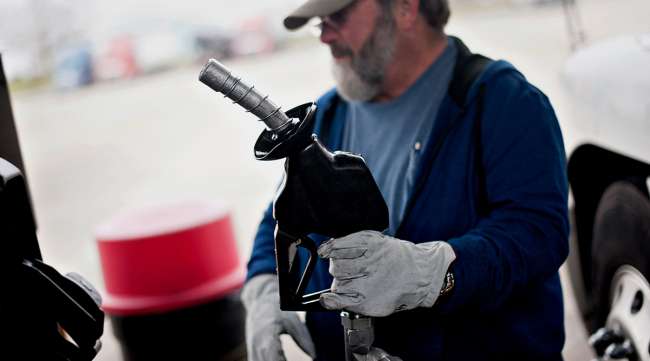Senior Reporter
Diesel Price Falls for Seventh Consecutive Week, Down 1.1¢ to $2.983 a Gallon

[Stay on top of transportation news: Get TTNews in your inbox.]
The U.S. average retail price of diesel dropped 1.1 cents to $2.983 per gallon, the Department of Energy reported Aug. 26, and the price of crude dropped to a two-week low amid the persistent tariff-related faceoff between the United States and China.
The price of diesel has fallen for seven consecutive weeks since July 15, when it cost $3.051 per gallon.
Trucking’s main fuel now costs 24.3 cents less than it did a year ago, when it was $3.226, DOE said.
All regions saw their respective average price fall, except in California where the average price was unchanged at $3.887 per gallon.

In our first episode of RoadSigns, Season Three, we ask: How Can Trucking Take Fuel Economy to the Next Level? Hear a snippet from host Seth Clevenger, above, and get the full program by going to RoadSigns.TTNews.com.
Also, the national average price for regular gasoline dropped 2.4 cents to $2.574 a gallon, DOE’s Energy Information Administration said.
All regions saw average prices decline. The Lower Atlantic posted the steepest decline at 4.4 cents and fell to $2.338 per gallon.
Meanwhile, some trucking fleets’ pursuit of improved fuel efficiency rolls on through what has become a blizzard of related information.
“There’s a lot of information out there, but there is a need for quality information,” said Daryl Bear, chief operating officer at Mesilla Valley Transportation Solutions, which conducts fuel efficiency tests on various products available for fleets. It is a subsidiary of truckload carrier Mesilla Valley Transportation in Las Cruces, N.M.
Mesilla Valley Transportation ranks No. 79 on the Transport Topics Top 100 list of the largest for-hire carriers in North America.
The trucking industry averages about 6 miles per gallon, Bear said, while some fleets such as MVT, average 9 mpg, or a 50% improvement.
“The question we’ve really been faced with is why aren’t more people improving fuel economy. The answer is, fleets are overwhelmed with information and they just don’t know what to do,” Bear told Transport Topics. “They don’t know what to believe for very good reasons because a lot of it is wrong. There are two sides to it. The unintentional side and the intentional side. The unintentional side is absolutely everywhere. Fuel economy claims are like diet fads. Everyone has a claim and an opinion. But it really comes down to the data. Who’s making the best progress with fuel economy and what are they doing?”
MVT Solutions recently announced the test reports for its certified products are now available on a no-cost subscription basis. Certified fuel economy testing by MVT Solutions was developed from race car engineering and advanced vehicle test methods using sensors and recording systems that collect data on fuel consumption, aerodynamics, rolling resistance, driver behavior and other variables that affect fuel consumption. The data is analyzed using proprietary methods. It has conducted more than 300 fuel economy tests, and does not receive any commission from suppliers’ product sales.
“We want to improve the trucking industry,” Bear said. “There is no such thing as cheap fuel. Whether it’s $3 or $4 it’s still a huge expense.”
U.S. oil/petroleum refineries produce most of the diesel fuel consumed in the United States. In 2018, imports of ultra-low sulfur distillate (ULSD) fuel oil, which is distillate fuel with a sulfur content of 15 parts per million or less, were equivalent to about 4% of total ULSD consumption in the United States, according to EIA. About 54% of ULSD imports in 2018 were from Canada. ULSD is sold as diesel fuel (ultra-low sulfur diesel) and heating oil in the United States.
Beginning in 2006, the U.S. Environmental Protection Agency began to phase in more stringent regulations to lower the amount of sulfur to 15 ppm. After 2010, all highway diesel fuel supplied to the market was required to be ULSD.
In related news, President Donald Trump, seeking to tamp down political fallout in U.S. farm states essential to his re-election, has ordered federal agencies to shift course on relieving some oil refineries of requirements to use biofuel such as corn-based ethanol.
Trump and top cabinet leaders decided Aug. 22 they wouldn’t make changes to just-issued waivers that allow small refineries to ignore the mandates, but agreed to start boosting biofuel-blending quotas to make up for expected exemptions beginning in 2021, Bloomberg News reported. Meanwhile, the prospects for a settlement in the protracted, increasingly bitter trade dispute between the world’s biggest economies has major implications for global growth that underpins energy demand, experts said.
West Texas Intermediate crude futures on the New York Mercantile Exchange closed at $53.74 on Aug. 26 compared with $56.21 per barrel Aug. 19.




